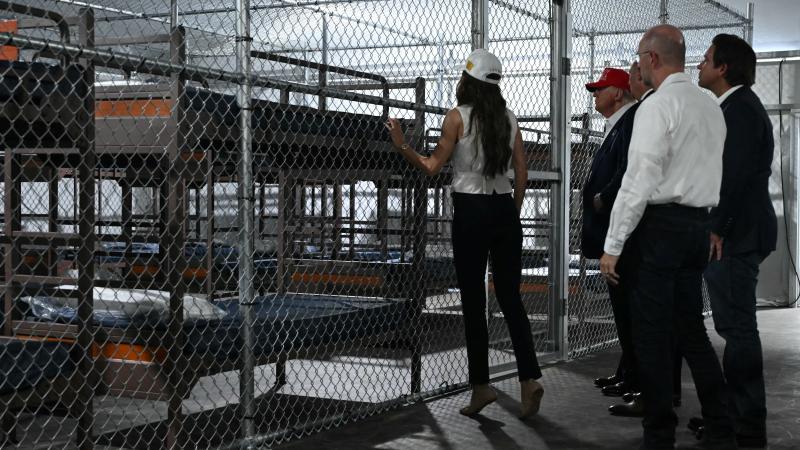Another key witness in Paxton trial testifies only circumstantial evidence brought to FBI
During cross examination, Penley’s testimony contradicted multiple allegations made in the House’s 20 articles of impeachment, specifically Article 10, which alleges Paxton took a bribe.
Another key witness who testified at the impeachment trial of suspended Texas Attorney General Ken Paxton said he had only circumstantial evidence when he went to the FBI alleging Paxton committed a crime. Mark Penley also testified he went to the FBI because he was angry because he felt Paxton “turned against” him.
Penley, a former criminal justice deputy who worked for Paxton for a short time, was fired for insubordination and sued claiming the OAG violated the Whistleblower Act. His and other former OAG staffers’ unsworn statements given to the House General Investigative Committe were the basis for impeachment charges levied against Paxton, including allegations of bribery, abuse of public trust, being unfit for office, among others.
During cross examination, Penley’s testimony contradicted multiple allegations made in the House’s 20 articles of impeachment, specifically Article 10, which alleges Paxton took a bribe.
Paxton’s attorney, Mitch Little, who cross examined Penley, pointed to Penley’s handwritten notes from August 13, 2020, which state Paxton was “possibly” being bribed. Little asked Penley, “you had absolutely no evidence, physical, documentary or circumstantial that Ken Paxton was being bribed by anyone, did you?”
“I had circumstantial evidence,” Penley replied.
“At some point did you go to your boss Ken Paxton and say, ‘Attorney General I’m concerned I have circumstantial evidence that you’ve taken a bribe?’ Did you do that?” Little asked.
“Not on the 13th of August,” Penley replied.
“You didn’t do that because you would get fired, correct?” Little asked.
“I said possible bribery; I didn’t have evidence to confront him with. Not at that time,” Penley said.
“But you just told … the jury you had circumstantial evidence. Did you confront him with the circumstantial evidence?” Little asked.
“No,” Penley replied.
In response to Little asking the same question again, he said, “Because I was trying to find a way to convince him to listen to reason and get away from this investigation, which I thought was harmful.”
“But also because you thought you would get fired?” Little asked.
“I could have been, and I was concerned about getting fired ever since Ken Paxton turned against me in the August 12 [2020] meeting,” he replied. Penley was referring to a meeting when Paxton disagreed with him about closing an investigation he asked Penley and others to conduct.
“By August 12th you thought this guy might fire me?” Little asked; Penley replied, “I did.”
“On August 13th you wrote down ‘maybe he’s being bribed’?” Little asked; Penley said, “Yes.”
“You didn’t confront him that day because presumably you’d have been fired, yes?” Little asked. Penley replied, “Could be.”
“The safer strategy is to wait a month and go to the FBI with whatever circumstantial evidence you have and adopt whistle blower status for the same information,” Little said.
The former OAG staffer’s Oct. 1, 2020, FBI complaint states, “We have a good faith belief that the attorney general is violating federal and or state law.”
When you filed the complaint, Little asked, “Did you bring any documentary or physical evidence to the FBI?”
“No documents, no physical evidence,” Penley said.
Referring to Penley’s earlier testimony, Little asked, “one of the reasons you thought Nate Paul had no credibility was he didn’t give you any documentary evidence, true?” Penley replied, “Correct.”
“If you had had any documentary evidence of any crimes [committed by] Ken Paxton you would have brought it to the FBI, wouldn’t you?” Little asked; “No,” Penley said.
“So you would have sat on it?” Little asked and repeated his question. Penley said, “no … it was an initial report [that was done] in a hurry.”
Little again asked, “Tell the … jury what evidence you have that Nate Paul paid Ken Paxton any type of bribe.”
“I’ve read the evidence that was filed in response to the motion for summary judgement,” Penley said.
“Legal analysis based on what you’ve read? You’re analyzing evidence other people are offering in this case?” Little said and asked again, “On September 26 [2020] did you have any physical evidence, documentary evidence, eyewitness evidence, or circumstantial evidence that Ken Paxton had been bribed by Nate Paul?”
“I had circumstantial evidence,” Penley replied. “Anything else?” Little asked.
“His behavior.” “Anything else?” “Campaign donation [from 2018].” “Anything else?”
“His absolute refusal to listen to common sense … he wouldn’t listen to anybody on executive staff,” Penley said.
When asked by Little, “it wasn’t a crime to follow up on this,” referring to determining if a federal search warrant had been altered, “it wasn’t interference with an FBI investigation, true?”
Penley replied, “To a certain point I agree,” and later, “No, it wasn’t a crime to follow up.”
“But your testimony earlier was you hoped to slow walk it. … Did you tell Ken Paxton that?” Little asked. “No,” Penley replied.
Penley also confirmed what he wrote in an August 2020 note from his conversation with Paxton was true: “Ken just wants the truth.”














